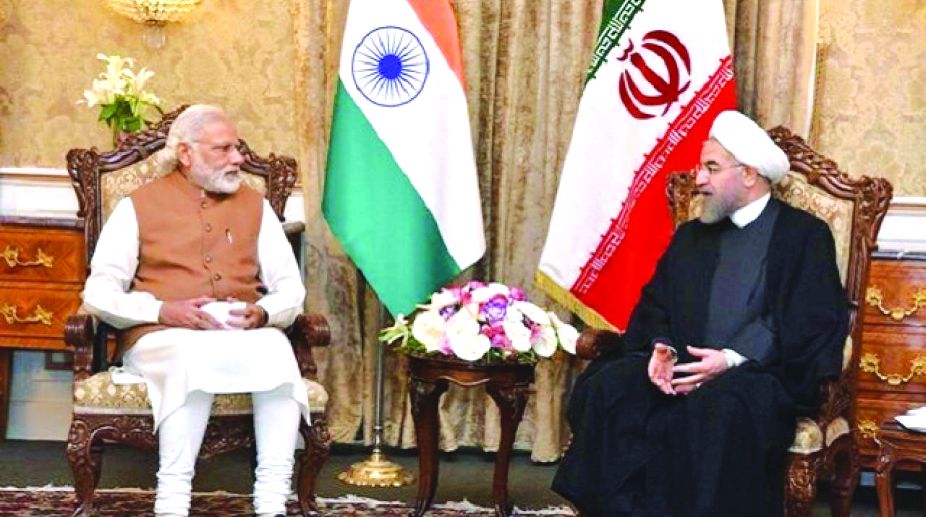On 29 October 2017, the trilateral transit trade route was implemented when the first shipment of wheat was sent from India to Afghanistan via Chabahar.
In August 2017, India’s Minister for Ports, Nitin Gadkari, said in Iran that the civil work at Chabahar port, developed by India is complete, and the government is ordering Rs 400 crore worth of mechanised equipment and cranes.
The port will be operational in 2018 to export Indian wheat to Afghanistan. After meeting the Iranian President, Hasan Rouhani, “now, we are building a railway line in Iran from Chabahar to Afghanistan, Uzbekistan and Russia”, he said.
In August 2017, India Global Ports Limited (IGPL) had applied for permission to run the Chabahar port in the interim, while Iran has already completed the construction of the jetty. IGPL will build two new terminals, one for the containers and another for the multi-purpose ships. In October 2017, IGPL had already started constructing the terminals after placing the order for the construction equipment.
On 29 October 2017, the first shipment through the port was sent from India en route to Afghanistan. To demonstrate the viability of the route, seven shipments of wheat were sent as aid to Afghanistan by the end of January 2018. American policy analyst Rorry Daniels has described both the Indian investment in Chabahar and the Chinese investment in Gwadar as generating perceptions of “strategic encirclement”.
According to her, China fears encirclement by the US, India by China, and Pakistan by India. The respective countries see all of these encirclements as “containment strategies”, which they attempt to break out of. Indian news commentator Shishir Gupta described the Chabahar Port deal as “a counter to the China-Pakistan Economic Corridor,” as it has “broken through the strategic encirclement by China and Pakistan.”
Scholar Neil Padukone however disagrees that India has the objective of encircling Pakistan. India needs access to iron from Afghanistan’s Hajigak mine and other natural resources from the Central Asian countries of Kazakhstan, Turkmenistan, and Uzbekistan, which is made possible by the Chabahar port. But, in the long run, the pipeline-to-road-to-rail-to-sea-to-road shipment costs through Chabahar should be circumvented by direct transit through Pakistan. So far, Pakistan has been reluctant to provide such access.
The US State Department does not currently see military cooperation between Iran and India as part of the Chabahar project, although it has cautioned India to remain within the legal parameters with respect to collaboration with Iran.
The US also sees the Indian presence in greater Central Asia beneficial for spreading the soft power of democratic and friendly regimes. India hopes to see the Western countries use the Chabahar route to establish a link to Afghanistan and reduce their dependence on Pakistan.
Comments in the Chinese Press have indicated that China is unlikely to see India’s efforts as strategic competition and that India’s contribution to infrastructure development in Central Asia will also benefit Chinese multinational corporations.
Padukone agrees that India has need for establishing a “naval counterweight” to China’s presence in Gwadar, as India sees the Gwadar Port as a manifestation of a strong China-Pakistan alliance that seeks to choke Indian investments in the Indian Ocean region.
Scholar Christophe Jaffrelot states that Gwadar gives the Chinese a key listening post to monitor US and Indian naval activity in the Persian Gulf as well as a dual-use civil-military base for Chinese ships and submarines. India perceives a direct threat and its response has been to help build the Chabahar port.
Iran has stated that Chabahar is not a rival to Pakistan’s Gwadar and invited Pakistan to join in its development. Pakistani analysts have endorsed the view, stating that Gwadar has an advantage by being a deep-sea port and the expansion of Chabahar would in fact expand trade through Gwadar.
Larger vessels that cannot dock at Chabahar could dock at Gwadar and the cargo trans-shipped to Chabahar. Pakistan’s foreign policy advisor Sartaj Aziz has signalled that Pakistan may link the Gwadar port to Chabahar, which is a remote possibility.
However, Pakistani military commentators have characterised the alliance between India, Iran, and Afghanistan as a “security threat to Pakistan”, one that has “ominous and far-reaching implications” for the region. Segments of the Pakistani media have regretted the country’s increasing “isolationism”.
Calling for an “immediate end to all support and sanctuaries enjoyed by terrorist groups,” India and Iran have said that “states that aid, abet and directly or indirectly support terrorism should be condemned.” On the face of it, this statement suggests that Iran is endorsing India’s position on Pakistan’s sponsoring of anti-India terrorism.
However, this may not be the case. India should not see this joint statement as suggestive of Iranian support to India on terrorism… emanating from Pakistan. The statement did not name Pakistan and could be referring to Iran’s troubles with terrorism emanating from Saudi Arabia.
Rouhani’s visit to India has happened amidst looming problems for Iran. With President Donald Trump opposed to the 2016 nuclear deal with Iran, there is a possibility of economic sanctions being re-imposed on Iran. Tehran is looking towards Delhi for investment and other assistance. India should avoid taking sides in the face-off between Iran and the US.
The Modi government has shown that it can be friendly with all the stakeholders in the conflict situations of West Asia. Only recently, the Prime Minister has demonstrated that it is possible to strengthen ties with Israel, even as India participates in Palestine’s development.
Just as we are managing well our growing relations with Saudi Arabia and Iran, so too is it possible for us to navigate through waters roiled by the tumultuous US-Iran relationship.
India must make it clear to the Trump administration that it wants strong relations with Iran. Its ties with Iran should not be determined in Washington.
(Concluded)
The writer is retired Professor of International Trade. He can be reached at vasu022@gmail.com
Advertisement











